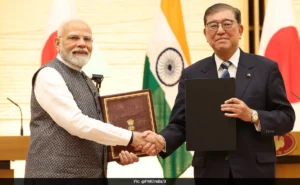GS2 – International Relations

Context
Prime Minister Narendra Modi’s participation in the 15th India-Japan Annual Summit reinforced the Special Strategic Partnership between the two nations, highlighting their collaboration amid regional uncertainties and a shifting global order.
Pillars of the India-Japan Special Strategic Partnership
- Defence and Security
- Strategic Consultations: The 2008 Defence Declaration and the institutionalised 2+2 Dialogue formalised regular security consultations.
- Logistics Cooperation: The 2020 Reciprocal Services Agreement facilitates joint logistics support and humanitarian operations.
- Military Exercises: Exercises such as Malabar, Dharma Guardian, and JIMEX improve interoperability and strengthen Indo-Pacific security.
- Intelligence Sharing: The 2015 Information Protection Agreement established a formal intelligence-sharing mechanism.
- Technological Collaboration: Projects like the UNICORN mast enhance maritime surveillance capabilities.
- Trade, Investment, and Economic Security
- Bilateral Trade: Trade remains around $23 billion, with a persistent trade deficit despite CEPA tariff reductions since 2011.
- Foreign Investment: Japan ranks as the fifth-largest investor in India, with cumulative FDI of ~$43 billion, bolstering Indian manufacturing.
- Economic Security Dialogue: Launched in 2024, it focuses on semiconductors, critical minerals, and digital cooperation.
- Corporate Presence: Approximately 1,400 Japanese companies operate in India, enhancing supply chains and industrial competitiveness.
- Development, Infrastructure, and Energy
- Official Development Assistance (ODA): Japan, the largest ODA contributor to India with $36 billion, supports transport, energy, and urban development projects.
- Transport Cooperation: The Mumbai-Ahmedabad bullet train exemplifies flagship collaboration in infrastructure.
- Energy Partnership: The 2022 Clean Energy Partnership focuses on hydrogen, renewable energy, and climate action.
- Sustainability Initiatives: Joint efforts promote aquaculture, forest conservation, and biodiversity protection.
- Multilateral and Regional Cooperation
- Quad Coordination: Strengthens collective maritime security and Indo-Pacific stability.
- Supply Chain Resilience Initiative (SCRI): Reduces dependency on China for critical goods.
- Global Forums: India and Japan collaborate in G20, ISA, CDRI, and IPEF, enhancing multilateral governance.
- Space Collaboration: ISRO-JAXA’s LUPEX mission showcases advanced cooperation in space exploration.
- People, Culture, and Education
- Academic Collaboration: 665 partnerships support research, teaching, and institutional exchanges.
- Skill Development: Programs like TITP and SSW allow Indian workers to gain practical industrial experience in Japan.
- Tourism & Cultural Exchange: The 2023–24 Year of Tourism Exchange promoted bilateral travel and cultural understanding.
- Diaspora: A 54,000-strong Indian community in Japan contributes to technology cooperation and cultural exchange.
Overview of India-Japan Relations
Evolution of Bilateral Ties
- Cultural Links: Buddhism fostered cultural connections since the 6th century.
- Diplomatic Restoration: The 1952 Treaty of Peace re-established post-war relations.
- Annual Summits: Regular summits have taken place since 2000, among Asia’s oldest bilateral summit mechanisms.
- Strategic Partnership: Bilateral relations progressed from a Global Partnership in 2000 to a Special Strategic Partnership in 2014.
Areas of Strategic Convergence
- Indo-Pacific: India’s Act East Policy and IPOI align with Japan’s FOIP, reinforcing regional strategic convergence.
- UN Reforms: Both nations advocate for UNSC reforms, enhancing joint leadership in multilateral institutions.
- Rules-Based Order: Commitment to democratic norms strengthens cooperation on global strategic issues.
Policies and Initiatives
- Act East Policy: Promotes India’s strategic engagement with Southeast Asia.
- Indo-Pacific Oceans Initiative (IPOI): Enhances maritime cooperation, connectivity, and economic growth.
- Free and Open Indo-Pacific (FOIP): Advances a rules-based order ensuring secure trade.
- Osaka Track: A plurilateral framework proposed by Japan for digital trade and data governance.




